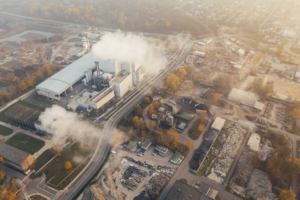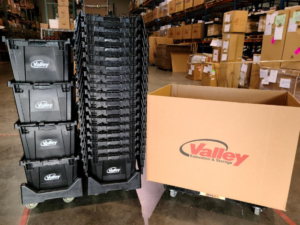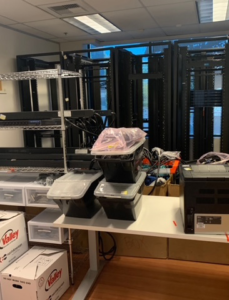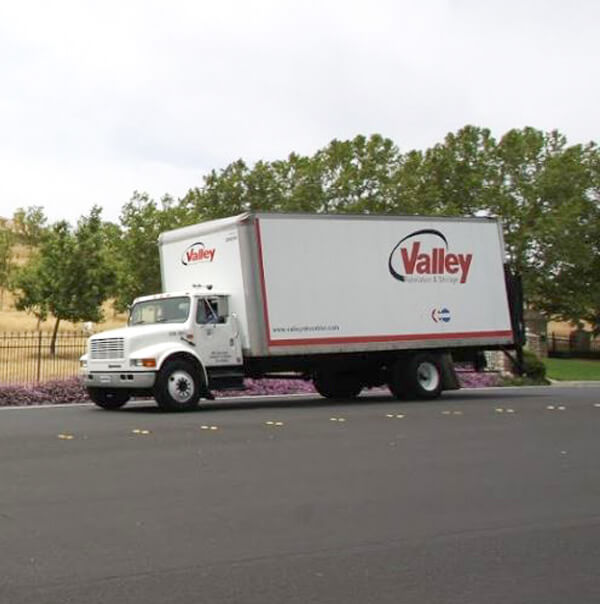Business relocation is common, but did you know it can significantly impact the environment? The process of relocating a business can result in the generation of large amounts of waste, emissions, and other negative environmental impacts.
However, commercial moving companies can potentially play a significant role in mitigating these impacts. Using sustainable practices, such as using eco-friendly materials, proper disposal of electronic waste, and providing sustainable packaging options, commercial moving companies can help reduce the environmental impact of the business relocation. They can play even larger roles.
Valley Relocation has been California’s leading commercial relocation service for nearly 40 years, and we’ve made a conscious effort to adopt practices that reduce waste during a relocation. So, let’s explore the environmental impact of business relocation and discuss how commercial moving companies can help mitigate these impacts through sustainable practices.
Environmental Impact of Business Relocation
Business relocation is no easy process. Not for the business moving, nor for the environment. Here are some common environmental impacts of business relocation.
1. Office Furniture Waste
Business relocation involves shifting office furniture, which can result in a significant amount of waste, an undeniable yet often ignored environmental impact of business relocation. In addition, this furniture waste can harm the environment.
Office furniture is made of various materials, such as wood, metal, plastic, and foam. These materials can release toxic substances into the environment, affecting air and water quality. Moreover, furniture waste takes up valuable landfill space and can take years to decompose.
To reduce the environmental impact of business relocation, companies can opt for eco-friendly furniture made of sustainable materials and recycled or reused, which can be obtained from commercial moving companies.
Another way to minimize furniture waste is to donate the furniture to non-profit organizations or schools. This approach reduces the environmental impact of business relocation, and 85% of consumers have a more positive image of the company.

2. Technology Waste
The environmental impact of business relocation involves technology waste due to shifting technology equipment, such as computers, printers, and servers. Technology waste is a significant concern for the environment, as these devices contain hazardous materials, such as lead, mercury, and cadmium, which can harm human health and the environment.
Moreover, technology waste can lead to the release of greenhouse gases and contribute to climate change. To reduce the environmental impact of technology waste, companies can opt for eco-friendly technology equipment, which is energy-efficient and made of sustainable materials.
Companies can also donate their old technology equipment to non-profit organizations or schools. Another way to minimize technology waste is to recycle the equipment through certified e-waste recycling centers, which can extract valuable materials and reduce the environmental impact of technology waste.
3. Noise Pollution
The environmental impact of business relocation also includes noise pollution, which can affect the environment and the well-being of people. The relocation process involves using heavy equipment, such as cranes and trucks, which can produce high levels of noise.
Noise pollution can have adverse effects on wildlife, such as disrupting their feeding and mating patterns, leading to a decline in their population. Moreover, noise pollution can cause hearing loss and other health issues in humans.
To minimize the environmental impact of noise pollution, companies can opt for relocating during off-peak hours or weekends when the noise levels are lower. They can also use sound barriers and mufflers to reduce the noise levels of heavy equipment.
4. Paper Waste
Business relocation can also result in paper waste, significantly impacting the environment. The relocation process involves handling various documents, such as contracts, agreements, and invoices, which can result in considerable paper waste.
Paper waste not only takes up valuable landfill space, accounting for 26% of total waste in landfills, but it also contributes to deforestation, severely impacting the environment. To reduce the environmental impact of paper waste, companies can opt for digital documentation, which can save paper and reduce their environmental footprint.
They can also use recycled paper and print on both sides of the paper to minimize paper waste. By adopting these practices, companies can contribute to a greener future and reduce their environmental impact. When working with commercial business movers, businesses can request digital contracts.
5. Plastic Waste
A common environmental impact of business relocation is plastic waste, which has become a significant concern. Companies use plastic materials for various purposes, such as packing, shipping, and storage, which can lead to considerable plastic waste.
Plastic waste takes years to decompose and can cause harm to the environment and wildlife. Moreover, plastic waste can lead to the release of greenhouse gases, contributing to climate change.
To reduce the environmental impact of plastic waste, companies can opt for eco-friendly alternatives, such as biodegradable or compostable materials. They can also use reusable packaging and encourage their employees to reduce their plastic usage.
By adopting these practices, companies can reduce their environmental footprint and create a positive impact on the environment.
6. Increased Use of Transportation
Business relocation also results in increased use of transportation, which can significantly impact the environment. The relocation process involves the transportation of various goods, such as furniture, equipment, and supplies, which can increase fuel consumption and emissions.
The increased use of transportation can lead to air pollution, which can cause respiratory and other health issues. To minimize the environmental impact of increased transportation, companies can opt for eco-friendly transportation options, such as electric or hybrid vehicles, or use only what they need.
By adopting these practices, companies can reduce their environmental footprint and create a positive impact on the environment.
7. Biodiversity Loss
Business relocation can also result in biodiversity loss, which significantly impacts the environment. The relocation process involves clearing land, which can destroy natural habitats and biodiversity loss.
This loss of biodiversity can adversely affect the environment and human health, such as the loss of ecosystem services and the reduction of natural resources.
To minimize the environmental impact of biodiversity loss, companies can opt for eco-friendly relocation options, such as choosing locations that have minimal impact on natural habitats.
Relocating businesses can also implement sustainable land use practices like reforestation and conservation efforts. By adopting these practices, companies can reduce their environmental footprint and create a positive impact on the environment.
8. Greenhouse Gas Emissions
Business relocation also results in greenhouse gas emissions, severely impacting the environment. The relocation process involves using various equipment and vehicles, which can lead to the release of greenhouse gases, such as carbon dioxide and methane. These gases contribute to climate change and adversely affect the environment and human health.
Companies can opt for eco-friendly alternatives, such as renewable energy sources like solar or wind power, to minimize the environmental impact of business relocation for greenhouse gas emissions.
They can also implement energy-efficient practices, such as turning off lights and appliances when not in use. By investing in these practices, companies can reduce their environmental footprint and positively impact the environment.

How Commercial Business Movers Can Help Mitigate The Environmental Impact
There are some environmental impacts that can only be mitigated if the business makes a conscious effort. However, for many of these impacts, the solution is hiring commercial business movers.
1. Sustainable Material Handling
Anyone moving on their own will have to purchase a lot of packing material (depending on the move). A business will likely need even more than that.
But unless the business owner is used to moving and knows the exact amount of packing material required, they’re likely to buy more than they need. What happens to the material that doesn’t get used? It gets tossed aside because of the hectic nature of the move. This contributes to land waste.
Commercial business movers can help mitigate the environmental impact of business relocation by adopting sustainable material handling practices. These practices include using eco-friendly materials, such as recycled and biodegradable materials, to reduce waste.
In addition, commercial relocation companies can use reusable crates and pallets, which can significantly reduce the amount of waste generated during the move.
Furthermore, they can opt for hybrid or electric trucks with lower carbon emissions than traditional gasoline-powered trucks. Commercial business movers can reduce their environmental footprint and promote sustainable practices by adopting sustainable material handling practices.

2. Donation & Disposal
Commercial business movers can also help mitigate the environmental impact of business relocation by adopting sustainable donation and disposal practices. Instead of disposing of unwanted furniture and equipment, commercial moving companies can donate these items to local charities or dispose of them ethically. Valley Relocation offers donation and disposal services to all its clients.
This approach reduces waste and promotes sustainability. In addition, commercial business movers can ensure that any items that need to be disposed of are done so in an environmentally friendly manner.
This involves partnering with waste management companies that practice sustainable waste disposal methods, such as recycling and composting. By adopting these practices, commercial business movers can reduce the amount of waste generated during the move and promote sustainable practices.
3. Providing Sustainable Packaging
Commercial business movers can also help mitigate the environmental impact of business relocation by providing sustainable packaging options. This includes using eco-friendly packaging materials, such as recycled cardboard boxes, biodegradable packing peanuts, and reusable bubble wrap.
Moreover, commercial moving companies can provide customers with packing tips that promote sustainable practices, such as packing items tightly to reduce the number of boxes needed.
By providing sustainable packaging options, commercial business movers can reduce the amount of waste generated during the move, promote sustainable practices, and reduce the environmental impact of the business relocation.

4. Identify Transportation Needs
Commercial business movers can help mitigate the environmental impact of business relocation by identifying transportation needs. This involves assessing the number of trucks needed for the move; the distance traveled, and the fuel efficiency of the trucks.
Valley Relocation does that through an on-site or virtual site survey where we assess all moving needs of a business and create a plan for the move. Commercial business movers can reduce fuel consumption and greenhouse gas emissions by optimizing transportation needs and promoting sustainable practices.
5. Inventory Management
Commercial business movers can also help mitigate the environmental impact of business relocation by implementing effective inventory management practices.
Inventory management involves assessing the items that need to be moved, identifying any unnecessary items, and reducing the number of items being moved.
Commercial business movers can reduce fuel consumption and greenhouse gas emissions by reducing the number of items being moved, promoting sustainable practices.
In addition, effective inventory management can reduce the amount of waste generated during the move and promote sustainable practices.
Looking for Your Moving Partner? Choose Us!
It’s essential to consider the environmental impact of business relocation, as it significantly affects our planet’s health. Fortunately, commercial moving companies can help businesses reduce their impact by implementing sustainable practices.
Valley Relocation is a top-notch choice for businesses in need of local commercial moving services in California. Boasting over thirty years of experience, we have a proven track record of providing exceptional commercial moving services across major cities in California, such as San Francisco, Sacramento, and San Jose.
Not only do we specialize in commercial relocation services, but we also offer temporary commercial storage solutions with flexible options to meet your specific needs.
At Valley Relocation, we understand that moving your business can be daunting, so we go the extra mile to make the process easier for you. We offer helpful moving tips and information on our blog to help guide you through the moving process.
Don’t hesitate to contact us to schedule your move, and let our team of professionals handle the entire process with ease and professionalism.
Contact Valley Relocation today and experience top-quality commercial moving services.







